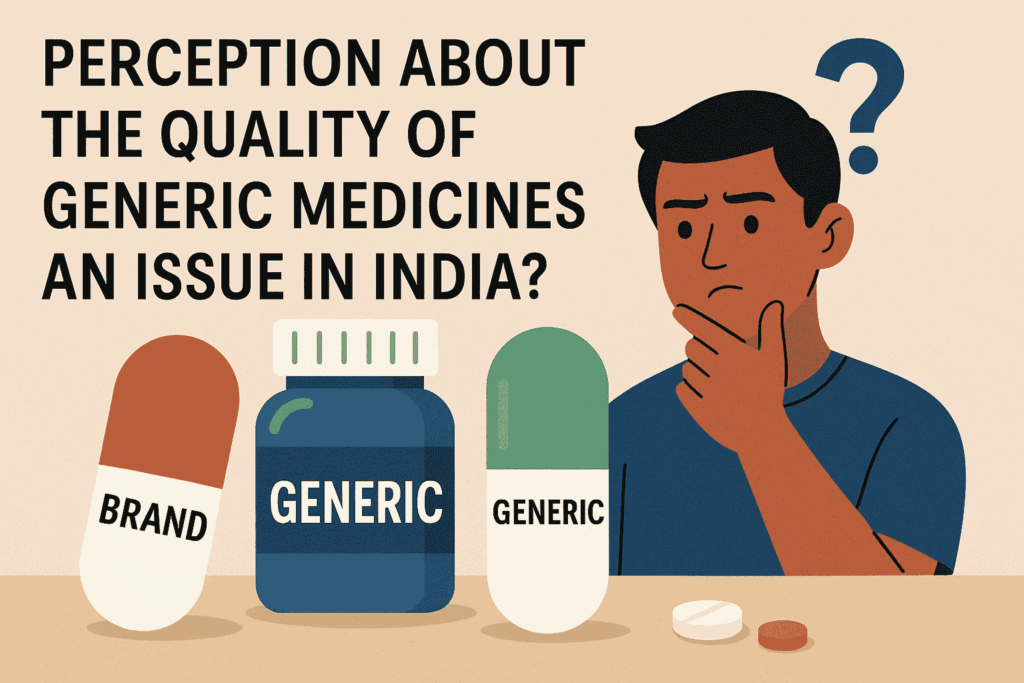Last updated on April 23rd, 2025 at 03:16 pm

Patients in India are often trapped in the vicious circle of getting prescribed expensive, branded medicines and buying those regularly. This is true for patients on regular medication for diabetes, blood pressure, cholesterol, etc.
Often, these branded medicines (which are expensive) are bought regularly. The cost of universal healthcare delivery in India would be around INR 1713 per person per annum in India. But, the cost would increase by 24% if branded medicines are used.
Studies have compared generic and branded pharmaceuticals, concluding that generics are just as effective and contain the same high-quality components. Let’s look into the reasons for the widespread disapproval of the latter.
– Medicine dispensers in India are usually selling fast-running medicines that are usually branded.
– Doctors have tie-up with these medical dispensers who get their split share when patients buy their prescribed medicine.
– Pharmaceutical companies have invested in patenting and advertising branded medicines. They create clout around such medicines, which makes patients skeptical of buying generics.
Dispensing of medications is mostly handled by pharmacists and drug sellers or salespeople in India. The worldwide use of generic medications to lower drug prices benefits patients and their communities. Low-cost price is one of the key advantages of generic medicines, and replacing them with branded ones can bring down the burden of medical costs on India’s poor. Let’s understand the role of pharmacists dispensing medicines and doctors recommending the same.
Role of pharmacists and doctors
People working in a retail medical store must have the qualifications and education (as a pharmacist). But that’s not the case in India. These personnel rely on ERP systems and databases to pick up medicines and essentially work to distribute prescriptions properly.
Visiting any local pharmacy store would let you discover that you can get medicine without a prescription for your ailments. Often, such retail pharmacy shops play a crucial role in facilitating the appropriate use of generic pharmaceuticals. Instead of distributing generics, they usually sell branded medicine.
While the production of generic drugs is more, it was researched that many healthcare providers still have a poor perception of generics and are reluctant to prescribe them.
Many medical professionals are against generic drug replacement because they think generic drugs are unsafe or ineffective. Plans to use generic substitution in primary care in the United Kingdom were met with significant resistance. The use of generic antiepileptic drugs and generic pregabalin for pain relief is also controversial.
Buyers question the generic drug quality since medical professionals and pharmacists do not widely endorse it. They do not push for generic medicine because they benefit from the margin. Often, pharmaceutical companies produce branded and generic medicines. Still, they are pushed through a sales channel that benefits both — doctors get their share to prescribe branded medicines, and pharma stores get more sales margin.
Another reason for such a perception of generic medicines in India is the lack of available information. Therefore, healthcare providers and governments need to educate the public and patients about the safety and efficacy of generic drugs.
The Road Ahead
As mentioned, the negative perception of generic medicines in India and the pharmaceutical lobby promoting branded medicines is already an issue. The patients are forced to pay more for lack of awareness, misinformation, and negative perception.
Removing such a perception of generic medicine in India requires conducting programs with investments in information about the quality of medicines. The government, generic medicine sellers or non-government organizations should do this. The aim should be to build trust amongst the buyers that generic medicines in India are just as safe and effective as branded ones.
This requires interventions addressing the general public and health professionals to combat the false belief that generic versions of a drug are not up to the mark. The Indian market also has another misconception that generics are only for the poor, partly because government initiatives promote generic drugs as cost-effective alternatives for marginalized populations. This makes the ones who can afford branded medicine believe that generic medicines’ quality could be better.
The customers should rather be informed about —
● Bioequivalence of generic medicines
● The QA process that every generic medicine goes through, including GMP, as laid out by WHO
● Branding companies that are producing generic ones.
Creating a level-playing field for generic and branded medicines requires publishing reports in the media. This includes showing a comparison between variants of branded and generic medicines.
Here are some of the key researches that were carried out to show that generic medicines are equivalent to branded —
●https://www.nature.com/articles/s41598-020-62318-y
●https://www.ncbi.nlm.nih.gov/pmc/articles/PMC6415809/
●https://bmcpharmacoltoxicol.biomedcentral.com/articles/10.1186/2050-6511-14-1
When discussing medical health reform, it is important to win customer trust. This begins by changing how the government operates Janaushadi stores and other healthcare initiatives to provide affordable generic medicines. Instead, it should improve the image and credibility of generic medicines. This requires allocating resources to foster customer trust and create an impact.
Branded drug companies actively promote their branded products to Indian doctors and pharmacists. Regarding marketing, generic versions of popular brands get less attention. That’s why you need an expert to talk about generic drugs. Consider the impact of celebrity endorsements on mutual funds (AMFEE) or Mr. Amitabh Bachchan giving transaction security tips as provided by RBI on a show Kaun Banega Crorepati (KBC).
How is Medkart creating a difference?
We are against the long-known practice of health professionals receiving commissions for boosting prescriptions of expensive branded medicines. That’s why we provide generic alternatives to prescribed branded medicines. Even if you are prescribed medicines by your doctor, bring us the prescription and we will offer you its equivalent generic medicines — pocket-friendly and uncompromised quality.
Walk into any of our 107 generic medical stores in India with a prescription to use generics and tap into effective cost savings.
Click here to explore Medkart website and order generic medicines.
Alternatively, you can use ourAndroid or iOS application for the same.